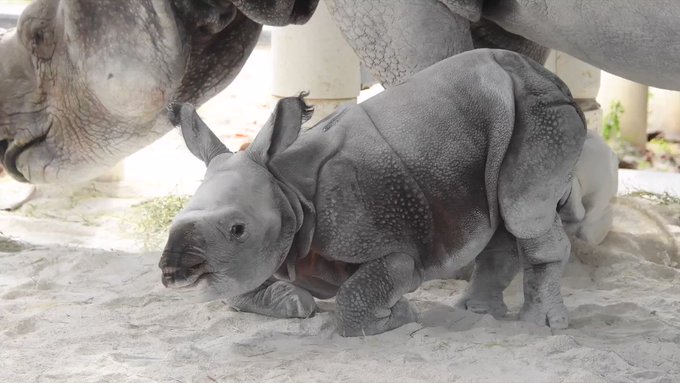For the first time ever, a rare species of rhino has been born by artificial insemination. The birth, which took place at Zoo Miami, is the first such successful case in recorded history of this species being born through induced ovulation and artificial insemination.
The one-horned Indian rhinoceros, whose gender remains unknown, was born Tuesday morning and remains in good health—as does Akuti, the baby’s mother.
In a statement quoted by WPLG, Zoo Miami wildlife expert Ron Magill said:
“The newborn is healthy and doing well but more detailed information will not become available until the veterinary team is able to do a neonatal exam … This will be performed when the staff feels that it can safely separate the infant from its very protective mother.”
The birth of Akuti’s baby is a huge win for conservation. In a Facebook post, Zoo Miami said:
“This very rare birth is not only significant for Zoo Miami, it is incredibly important to the international efforts to maintain a healthy population under human care of this highly vulnerable species throughout the world.”
The species is rare thanks to constant poaching for its horn and the fact that the gestation period for Indian rhinos is between 15 and 16 months. Mothers typically give birth to a single calf every two to three years.
The Zoo added:
“There are less than 3,000 Indian rhinos left in the wild occurring in small protected areas of Nepal, India, and Assam. Over the years, they have been poached extensively for their horn which is used for medicinal purposes and for dagger handles that are revered in some Asian cultures. They are the world’s fourth largest land mammal sometimes reaching a weight of 6,000 pounds.”
Seven-year-old Akuti—which means “princess” in Hindi—and the 18-year-old father, Suru, were both born at San Diego’s Zoo Safari Park. While Suru arrived at Zoo Miami in 2003, Aktui arrived in 2016. After several unsuccessful natural breeding attempts, a team of expert from the South East Zoo Alliance for Reproduction and Conservation (SEZARC) along with Cincinnati Zoo reproductive physiologist Monica Stoops, began the process of artificially inseminating Akuti last January. She was also regularly subject to ultrasound examinations along with constant care and observation.
SEZARC, which also works with a number of zoos and aquariums across the United States to help restore the populations of rare species through reproductive science, tried last year to artificially inseminate a white rhino at Jacksonville Zoo. The attempt was unsuccessful.
Magill noted that Akuti’s birth is the second successful birth of the endangered species in the history of Zoo Miami. As such, the staff remains on-guard in case of any possible complications.
Magill added:
“It is critical that the mother and newborn are able to establish a bond which can sometimes be a challenge for first time mothers.”
After a few weeks of care and settling-in, the family will be back on public display. Magill is sure that across the world, experts will find cause for celebration once the baby passes through its stage of immediate infancy.
Image credit: Zoo Miami


Comments
Post a Comment